May 5, 2025 Artificial Intelligence
AI in Real Estate: Top Use Cases, Benefits, and Future Trends Across Industry
May 5, 2025 Artificial Intelligence
Table of Contents
May 5, 2025 Artificial Intelligence
AI in real estate is not this science-fiction movie idea anymore. It’s actually making waves and revolutionizing the way the property market does business. I mean, think about it – from the way we look for properties to how we seal deals and get through everything in between, AI is introducing efficiency and a level of personalization that we’ve just never witnessed before.
So, in this guide, we will take you on a tour of the various use cases of artificial intelligence in real estate today. We’ll look at all the important things happening, the real benefits that come with it, and even peek into what the future might hold in 2025.
Plus, we’ll break down the tech that makes all this possible and what businesses need to consider, either cost-wise or in terms of infrastructure, talent acquisition, and long-term strategy, to successfully integrate AI in commercial real estate.
If you want to jump into the AI ecosystem. It’s an exciting time to be involved in real estate, that’s for sure. Don’t you agree? Check out the statistics provided below to see why investing in artificial intelligence & machine learning in real estate is a safe bet.
Implementing AI in real estate could initially seem like a costly economic burden. But the market statistics below should affirm the realization that AI integration is quickly becoming the new norm for achieving and maintaining the competitive edge in the real estate sector.
Consider these mind-blowing stats that showcase the growing significance of AI in the real estate industry:
Industry trends follow a robust growth trajectory in the global market for artificial intelligence in Real Estate. The market size is pegged at $303.06 billion in 2025, a remarkable surge from $222.65 billion in 2024.
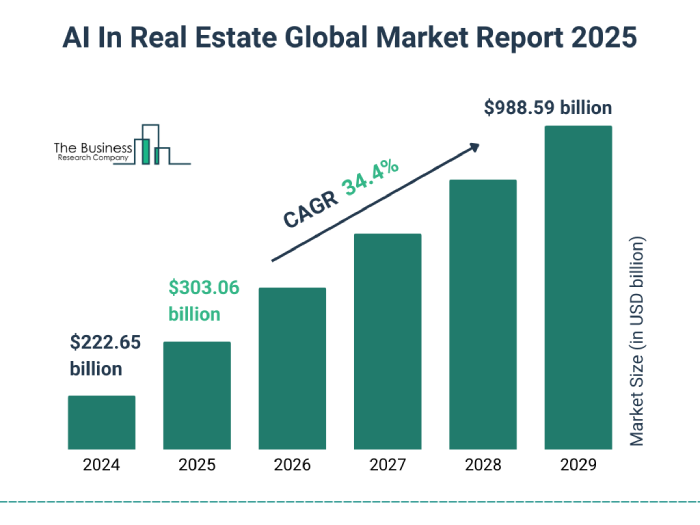
By 2029, the market is expected to approach $988.59 billion, continuing at a CAGR of 34.4%
Generative AI, being a part of the AI segment, is also expanding tremendously in the real estate sector. It’s worth is estimated at $488.06 million in 2025 and shall be $1.3 billion by 2034 growing at a CAGR of 11.52%
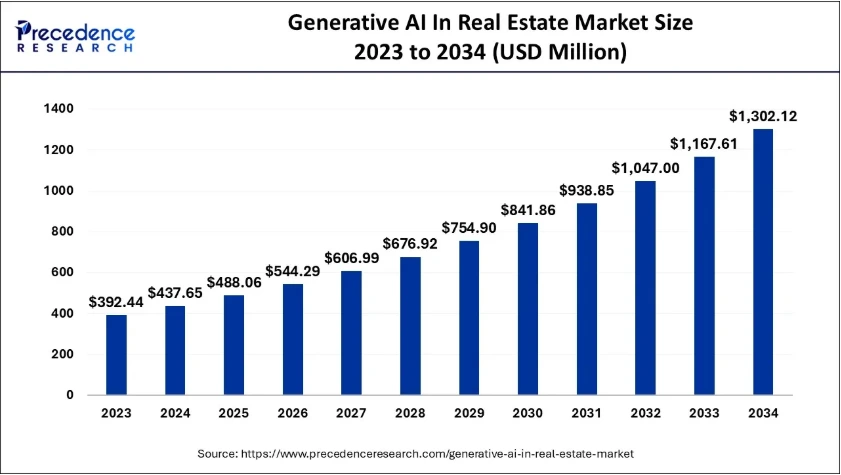
This record-breaking growth is symptomatic of accelerated adoption and utilization of AI technology in real estate across business verticals.
Moreover, most real estate futurists are already utilizing AI to automate processes. Over 65% of the real estate agencies and brokerages have integrated AI tools into their business to aid in simplifying routine tasks and boosting efficiency, as per reports.
But, how does AI work in real estate?
Real estate is transformed by artificial intelligence through complex algorithms and machine learning to scan vast pools of property information, market information, and user information. This makes it possible:
Essentially, AI handles big real estate data in the correct manner to deliver more precise insights, customized experiences, and efficient operations, basically revolutionizing the business.
Now, how to use artificial intelligence in real estate?
The AI use cases in real estate are diverse and only expanding as the technology evolves. Let’s explore each of the most significant use cases in depth:
Property searching has always been the form of sifting through a lot of listings with little filtering. Artificial intelligence in Real Estate makes it far smarter. With sophisticated algorithms and machine learning, AI can examine a vast universe of data points well beyond basic parameters of price and location.
AI takes into account sophisticated preferences like –
For example, AI in commercial real estate uses AI to connect investors with properties using sophisticated investment criteria such as capitalization rates, tenant profiles, and appreciation potential, greatly simplifying the due diligence process.
In addition, AI can also learn from users’ behavior, improving search results over time and becoming more precise and accurate. Eventually, this tech saves users hundreds of hours and shows them properties they are much more likely to be interested in.
Establishing the true value of a property is vital to the buyer and seller. Older methods of appraisal are time-consuming and prone to human error. AI offers a more data-driven and less subjective process.
AI applications process and ingest enormous amounts of data, such as-
This level of analysis enables AI to create very precise property values and price estimates. Tools such as automated valuation models (AVMs) improve and learn increasingly with each piece of additional information fed in.
This functionality is of extremely high benefit to real estate practitioners who wish to make data-driven price offers and investors looking to find undervalued or overvalued assets.
For example:
Zillow’s Zestimate: This widely used tool employs AI algorithms to provide instant home value estimates based on public records, user-submitted data, and market trends.
With today’s extremely competitive real estate industry, proper marketing is critical. AI-driven marketing solutions are transforming how agencies and agents acquire and connect motivated buyers.
AI programs scour immense amounts of digital information, such as website browsing, social networking posting, and search queries, to pinpoint individuals who are actually seeking to purchase, sell, or lease homes.
This enables highly focused advertising campaigns so that marketing is delivered to the most appropriate audience.
AI can also tailor marketing messages and content to specific user profiles and behavior, creating higher engagement and conversion.
For example, Agentic AI in real estate represents a significant leap towards truly intelligent and self-operating systems that can augment and enhance the capabilities of real estate professionals.
Real estate transactions are normally complex and have many intermediaries and long paperwork. Blockchain technology, coupled with artificial intelligence, can be employed to secure and automate such procedures.
Smart contracts, i.e., self-executing contracts on the blockchain, can execute different stages of a transaction on fulfillment of pre-authored conditions.
AI can be employed to confirm the conditions of such contracts and invoke their execution. This can result in shorter closing times, less paperwork, lower transaction costs, and greater transparency.
AI-driven solutions for real estate via blockchain can further improve security through an immutable and auditable chain of ownership and transactions, cutting down on fraud and dispute risks. A Blockchain software development company led the way in creating such breakthrough solutions.
Moreover, Deloitte’s survey on the commercial real estate outlook for 2024 has some interesting findings. It turns out that more than 72% of real estate owners and investors—people from all around the world—are either already putting their money into AI solutions or they’re planning to do so pretty soon.
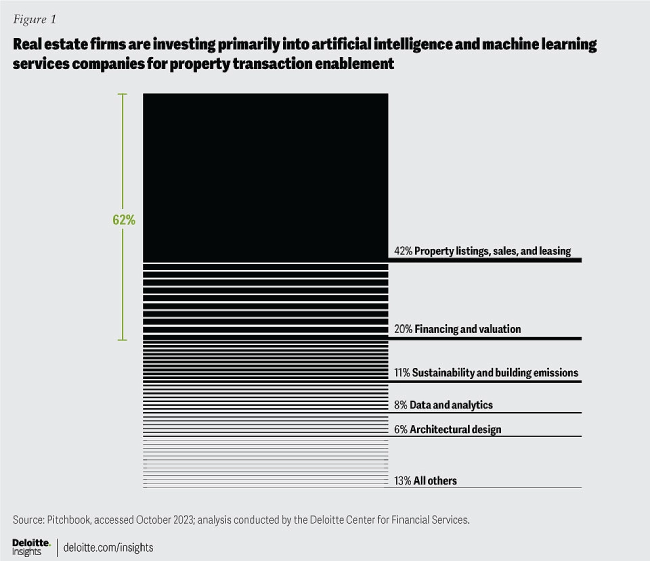
Proper property management is essential for landlords as well as property management firms. AI provides a package of solutions for optimizing different dimensions of property management. AI-powered predictive maintenance programs can scan through sensor data across properties to foretell possible maintenance issues (e.g., air conditioning breakdown, water leaks) ahead of time.
So, maintenance may be done ahead of time in a bid to avert expensive emergency actions. AI can further facilitate automated tenant communication, rent collection, and lease administration.
Apart from this, AI in real estate management can also maximize the energy usage of buildings by monitoring usage patterns and modifying systems such as:
With the rapid pace of modern life, instant information and support are imperative. Conversational AI in real estate, in the likeness of chatbots and virtual assistants, offers customer care 24/7.
These AI-based agents can respond to commonly asked questions regarding properties, neighborhoods, and the buying and selling process. They can also arrange property viewings, gather user data, and even lead users through early phases of the property hunt.
By answering routine questions, chatbots enable human agents to concentrate on advanced work and devote individualized attention to serious leads.
Physical property tours are geographically limiting and time-consuming. AI is also making virtual tours more interactive and informative to offer richer distant experiences.
AI tools are able to read 360-degree photos and videos and create interactive 3D representations of the properties, so potential renters or buyers can view rooms virtually at their own pace.
AI can also introduce interactive features in virtual tours, like:
| Interactive Feature | Benefit |
| Pop-up tips | Instant info on features |
| Virtual furniture | Visualize living in the space |
| Change viewing angle | Complete perspective control |
| Integrated floor plans | Easy navigation between rooms |
| Virtual agent Q&A | Real-time answers to questions |
| Customizable finishes | Visualize personal style |
| Embedded multimedia | Richer context (neighborhood, agent info) |
| Virtual measurements | Understand room sizes |
| Social sharing | Get feedback easily |
| Live virtual tour link | Seamless transition to personal interaction |
| Accessibility features | Wider audience reach |
| Gamified exploration | Engaging way to discover features |
| Virtual notes/questions | Asynchronous communication with agent |
| Comparative property view | Easy comparison with similar listings |
| Dynamic time/lighting | Understand light and ambiance throughout the day |
Artificial intelligence technology increases the scope of coverage of properties and enables more effective initial screening.
The real estate sector generates a vast volume of data. AI is capable of analyzing vast and complex amounts of data to identify useful insights that would be hard or impossible to detect by humans manually.
Computer algorithms can analyze trends in the market, recognize purchasing behavior patterns, forecast future changes in prices, and measure risk in various investments.
Such evidence-based decision-making enables real estate practitioners to be more informed in their choices and give more strategic counsel to clients.
Investors need to know future market conditions. Generative AI real estate and other sophisticated AI methods using past data, economic factors, demographic changes, and other things that can predict:
Investors will identify a good opportunity and miss bad ones with the help of prediction models.
Real estate transactions take a lot of paper, such as contracts, leases, and legal documents. Automated document processing powered by AI can extract important information from these documents, saving time and minimizing errors. AI can help ensure compliance and highlight possible issues in documents.
The property transaction’s value-based character subjects it to fraud. Patterns in transactions and suspicious behavior that are identifiable for the purposes of using in creating fictitious activity can be identified by AI. This is used to protect buyers, sellers, and real estate agents from loss.
Similarly, how websites of online stores suggest products according to previous buys, Using AI for Real Estate can suggest highly customized property suggestions according to a user’s expressed likes, search history, bookmarked properties, and even demographic information. Such personalization improves the user experience and is more likely to lead to finding the perfect property.
AI is also increasingly being applied to smart building design and operations. AI methods can track energy consumption data, usage patterns, and weather to optimize building systems to realize maximum energy efficiency and user comfort. This results in more sustainable real estate operations and reduced operating expenses.
Implementation of AI in the real estate industry offers a range of desirable benefits:
The future of AI in real estate is evolving rapidly and is ever-changing. Peeking into the year 2025 and further into the future, there are a few broad AI trends that will completely transform the sector:
Through its capability of generating photorealistic property images, compelling marketing descriptions, virtual staging floor plans, and bespoke virtual tours, it represents an evolutionary leap in property marketing and display. Its disruptive potential runs across the entire value chain, affecting valuation, management, and investment analysis.
By collaborating with a Generative AI development company, commercial real estate companies can gain the key competitive advantage. They can provide innovative, effective, and affordable solutions that maximize customer experience, simplify operations, and ultimately drive growth in this fast-changing digital world. Investment in Generative AI is not a vision of the future but a strategy of the future.
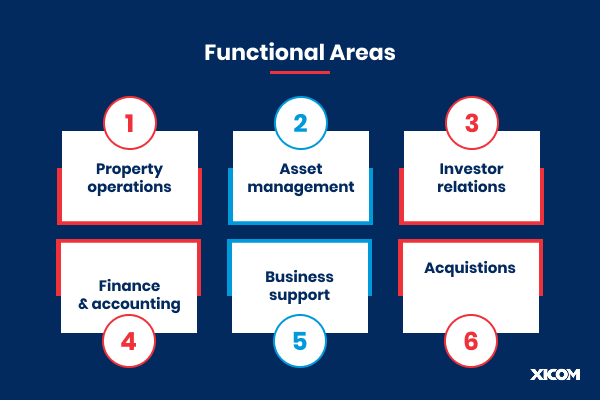
Firms that are interested in incorporating artificial intelligence tech in Real Estate can choose to hire dedicated developers in India with experience in these technologies at a lower cost.
To deploy AI technology in real estate operations, it is necessary to adopt a well-planned and strategic process to achieve efficiency, improve the quality of service, and increase productivity. The following complete guide provides major steps to effectively automate real estate processes in your business operations:
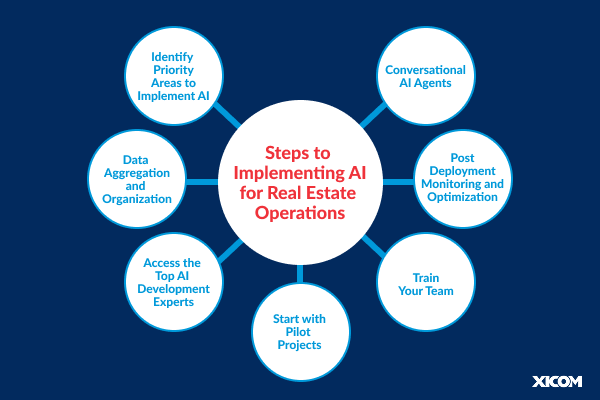
Take a close look at your real estate workflows to identify precise areas where AI will be capable of creating noteworthy value. Review AI implementations for lead generation and qualification, property valuation, customer communication, property management, and transaction processing. Prioritize AI initiatives based on your most urgent needs and most significant opportunity for return on investment.
AI works best with precise and relevant data. Make sure that your real estate business has solid processes for aggregating and storing data from varied sources like property listings databases, CRM, web analytics, and market data feeds. Data gathered must be organized, cleaned, and structured to enable intelligent analysis and informed decision-making by AI algorithms.
Property companies can either outsource to a well-known top AI development company or hire individual developers in India proficient in AI to create customized software solutions specifically catering to the requirements of your company. These experts will offer seamless integration into your current property systems as well as ongoing support and maintenance.
For companies new to AI in real estate, it is best to first pilot AI solutions on a small scale through pilot programs. It enables you to test their performance in actual conditions, determine potential operational issues, and monitor key measures such as ROI before full implementation. Pilot projects give quality feedback and enable needed adjustments before broader deployment.
Invest in extensive training programs to empower your real estate team with the requisite skills to leverage and optimize AI systems. An effective team will be more efficient, learn to adapt to new technologies easily, and help create a smoother and more efficient AI implementation process.
Integration of AI is not a one-time event, it’s ongoing. Continuously monitor the performance of your AI systems with the help of data analytics and customer feedback. By continuously monitoring, you get a chance to determine areas for optimization, improve the AI algorithms, and make sure that the technology keeps up with changing business needs and market trends.
As mentioned above, virtual assistants and chatbots based on AI are becoming smarter, performing customer service activities, qualifying leads, and offering instant assistance to prospective buyers. These conversational AI agents in real estate use NLP and machine learning technology to interpret and reply to user commands efficiently, driving customer satisfaction and releasing human agents for complex interactions.
While the advantages of adopting AI in the real estate business are immense, companies can face a series of problems when adopting and implementing it. But by providing due emphasis to solutions falling under the category of strategic ones, real estate companies can explore the entire potential of AI in order to grow their business and encourage innovation. The common problems real estate units face while adopting AI in their processes are mentioned below, along with possible solutions:
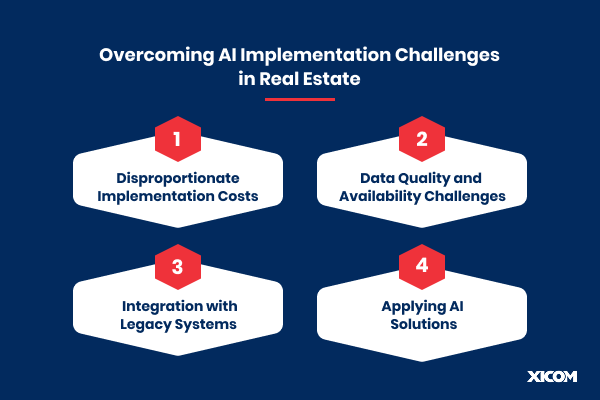
The high upfront cost of implementing Artificial Intelligence for real estate businesses may be expensive, and such could be a budget concern for small companies.
Solution: In the era of total system transformation, companies can adopt a phased implementation of AI by adding it to some aspects first. This is more incremental spending and facilitates demonstration of ROI prior to mass adoption.
AI algorithms rely on high-quality data. Fragmented data present in different systems or incomplete data, or invalid data can become a roadblock in the proper implementation of AI in real estate.
Solution: Real estate firms need to accord top priority to data integration by connecting their various systems and eliminating data silos. Implementing effective data management processes that ensure accuracy, consistency, and availability of the data within the organization is important.
Older and established real estate firms mostly employ old systems that are not always equipped to provide the degree of compatibility required to provide advanced AI technologies.
Solution: Use of integration platforms and API development can bring about frictionless data exchange and the integration of new AI technology into legacy infrastructure. It enables businesses to leverage existing investments while opening up to new AI-based solutions.
Real estate activities involve various kinds of workflows, ranging from marketing and sales to property management and transactions. An AI solution that works perfectly in one operational context is not automatically transferable or scalable across others.
Solution: The most prevalent practice is to retain a developer or collaborate with the best IT company in a bid to deploy personalized AI solutions specifically created based on the individual needs of various departments and business processes. It can also render AI applications in real estate more scalable for the whole firm, utilizing cloud platforms (Azure vs. AWS vs. Google Cloud).
The development of an AI-powered real estate application depends on various complex elements which determine total expenses. Some of them are:
This general cost analysis shows the following data points based on gathered information.
Within the basic real estate app category users can access necessary elements which include listings of properties combined with search capabilities and filter tools along with user profiles joined by map integrations. An app with these features falls within a budget range starting from $15,000 extending to $60,000.
The Medium Complexity Real Estate App provides users access to interactive maps together with property recommendations and in-app messaging and virtual tours and basic AI-powered suggestions. The total project expenses span from $45,000 until they reach $110,000.
The advanced/enterprise level Real Estate App features artificial intelligence capabilities through personalized recommendation engines and AI price trend analytic engines and contains user support automation tools as well as real estate property viewing through augmented reality. It may offer blockchain transactions security and smart home functionalities through Internet of Things features. Creating such an app requires an investment between $100,000 and $200,000 or beyond.
The above trends, use cases, and statistics richly indicate that AI in Real Estate is not merely a passing trend but an integral redefinition of the sector. Its influence on pivotal areas such as predictive maintenance for property management, intelligent matching of properties, automated valuations, and marketing is already driving meaningful developments. Top real estate firms and startup businesses are using the strong capabilities of AI to gain a competitive edge and deliver enhanced services to customers.
But real estate firms need to recruit professionals who have expertise in developing, implementing, and sustaining AI-based applications in order to extract the maximum from AI. It is for this reason that it is extremely important to hire software developers who possess special expertise in AI and thorough knowledge of the real estate sector.
Collaborating with a top software development company like Xicom can enable real estate organizations to realize personalized, scalable, and affordable AI solutions that realize measurable benefits and set them up for success within the changing real estate landscape.
Various AI solutions assist real estate operators by producing property descriptions, building virtual property tours and conducting buyer research and property management tasks, and performing listing accuracy checks.
Popular tools include TensorFlow, PyTorch, and Scikit-learn for machine learning, OpenCV for image recognition, and Natural Language Toolkit (NLTK) or spaCy for chatbots and document analysis.
AI is revolutionizing real estate with intelligent, data-driven applications. The most sought-after types of AI applications are:
Property Recommendation Apps – User-behavior-driven personalized listings.
AI Chatbots – Virtual 24/7 assistants for lead capture and customer support.
Predictive Analytics Tools – Predict property prices and investment ROI.
Automated Valuation Models (AVMs) – Property pricing estimates in a moment.
Virtual Tour & Image Recognition Apps – Intelligent tagging and 3D walkthroughs.
Smart Property Management Systems – Automate rent payments, maintenance, and communications.
Document Automation Apps – Automate filling in contracts and legal extraction of data.
Fraud Detection Platforms – Identifying phantom listings and shady transactions.
We build AI-driven real estate apps to suit your business requirements. From conceptualizing and UI/UX design to AI model deployment and post-launch maintenance—our end-to-end solutions are scalable, secure, and user-friendly.
Development time depends on features, complexity, and integrations. A simple AI chatbot can be done in 3–4 weeks, and a full platform such as a valuation or virtual tour app can take 2–4 months.
AI models utilize property listings, price history, location information, user activity, demographic patterns, and occasionally satellite imagery or IoT data for smart buildings.
Cost varies based on functionality, tech stack, and custom features. A basic AI chatbot or recommendation engine can cost between $5,000–$15,000, while advanced ones such as predictive analytics platforms, automated valuation models (AVMs), or virtual tour apps can range from $25,000 to $100,000+. The investment amount also depends on data integration, third-party APIs, UI/UX design, and post-launch support.
Collaborating with the appropriate development team is cost-effective without sacrificing quality and scalability.